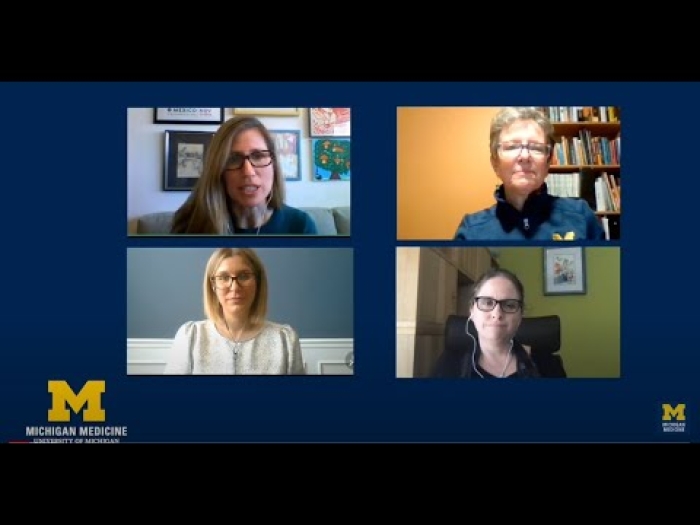Experts tackle processing change while understanding feelings, responding to new behaviors, juggling home and work and managing screen time during the coronavirus crisis.
1:15 PM
Author |
A nationally recognized panel of Michigan Medicine specialists tackle stressors, concerns and difficulties families face in the ever-changing environment of the current global pandemic. With candid conversations on parenting, the group addresses child behavior, mental health and relationships. Find all the episodes here.
While everyone adjusts to a virtual world lacking in daily interactions, like the convenience of walking into a store or restaurant, it's only natural that the pandemic start to take a toll on your health and relationships.
And the transition can be particularly hard on families. Some parents are trying to juggle becoming a teacher and working from home, while others are stressed about job loss and where they'll find their next meal. Some children are missing critical therapies they depend on, while some teens are missing milestone graduations and senior proms.
There's no way around it: This is tough.
MORE FROM MICHIGAN: Sign up for our weekly newsletter
But Thrive With Your Family is here to help. The new video series helps parents navigate the ever-changing environment of the COVID-19 pandemic, with a panel consisting of two psychiatrists, a psychologist and a development behavioral specialist that cover a wide range of topics, including traumatic stress, parent mental health, enhancing parent-child relationships, difficult conversations with kids and teens, behavioral changes, screen time and media use, and more. But, most of all, it can help you maintain a sense of hope and understanding.
In the first episode, the panelists covered:
-
How children process changes going on in their lives and how to understand their feelings (10:06)
-
How to respond when children's behavior is a bit crazier or dysregulated (23:49)
-
How to juggle work and home (28:32)
-
Some initial thoughts about managing screen time during school closures (33:00)
Editor's note: Information on the COVID-19 crisis is constantly changing. For the latest numbers and updates, keep checking the CDC's website. For the most up-to-date information from Michigan Medicine, visit the hospital's Coronavirus (COVID-19) webpage.
Interested in a COVID-19 clinical trial? Health research is critical to ending the COVID-19 pandemic. Our researchers are hard at work to find vaccines and other ways to potentially prevent and treat the disease and need your help. Sign up to be considered for a clinical trial at Michigan Medicine.
Like Podcasts? Add the Michigan Medicine News Break to your Alexa-enabled device or subscribe for daily updates on iTunes, Google Play and Stitcher.

Explore a variety of health care news & stories by visiting the Health Lab home page for more articles.

Department of Communication at Michigan Medicine
Want top health & research news weekly? Sign up for Health Lab’s newsletters today!





